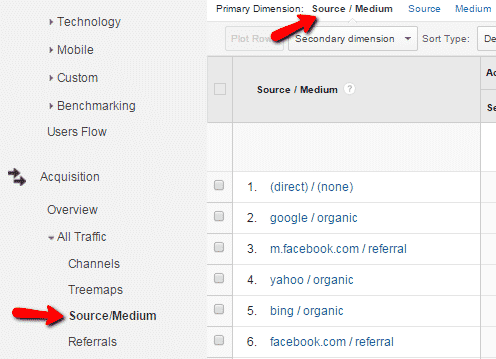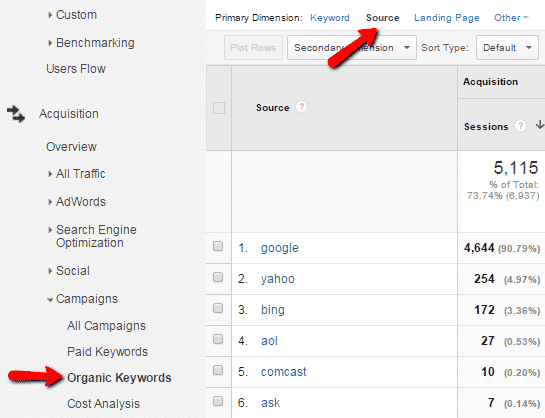We get this question all the time here at Netvantage: “We’re focusing a lot of our attention on Google. What about Bing and Yahoo? What should we be doing to make sure we rank well there too?”
It’s a legitimate question; when we talk about search engines, Google dominates the conversation. But are SEOs somehow missing out on great opportunities by forgetting about the lesser mentioned search engines? How are Bing and Yahoo’s ranking factors different from Google? Are there bright futures ahead for either Bing or Yahoo that we should keep in mind?
First, how do you determine which search engines are currently driving traffic to your website? Google Analytics provides information on that. Once you’re in the Google Analytics profile of your website, click the “Navigation” tab in the left menu. In the dropdown, select “All Traffic” and then “Source/Medium.” This should display a list of your website’s traffic sources.

You can also go to “Campaigns” and then “Organic Keywords” to only display data from organic search. Then change your primary dimension from “Keyword” to “Source.”

For this example, about 91% of the website’s search engine traffic comes from Google, which is fairly typical.
I’ll try to keep this post updated to the best of my abilities, however it should be noted that Google frequently moves things around in Google Analytics, so the steps for viewing your search engine traffic data may be different tomorrow.
Partnerships
When evaluating search engines, it is important to know that search engines own products and make partnerships with other companies, which can play a role in search engine market share.
Browsers
It should be noted that the web browser that people use plays a huge role in the popularity of search engines like Google, and why Bing and Yahoo! are both still hanging around. People often don’t care enough to change the default search engine that their web browser uses. Google owns Google Chrome, so naturally Google search is the default search engine for the Google Chrome web browser. Mozilla Firefox is independent, but has a deal with Yahoo. The rise in popularity of the Google Chrome web browser has played a part I the rise of Google’s market share of the past few years.
Products
The operating systems of cell phones, tablets, laptops, etc. typically have a default search engine installed. These kind of deals between search engines and product manufacturers are made all the time – some are going on now. They are extremely important for the long term success of the search engines. Unless the product owner manually changes the default search engine, they’ll continue using whatever they currently have in place.
The use and popularity of other products also plays a role in the use of specific search engines. For example, Google owns Gmail, Youtube and Google Maps. Microsoft owns Xbox, MSN, Nokia and Skype. Yahoo! owns Flickr, Tumblr and Yahoo Finance.
Bing & Yahoo! Are Pretty Much The Same Thing
Why is that? Yahoo! and Bing made a partnership in July of 2009 that resulted in Bing powering Yahoo! Search. Their partnership also allows advertisers to display advertisements on both the Bing and Yahoo search and display networks. So it is safe to say that ranking factors for Bing and Yahoo! are going to be nearly identical, and the information pulled for various types of searches will mostly be the same.
Layout
Search Engine Results Pages (SERPs) will be different across all three search engines, with the placement of advertisements, visual differences between organic and paid or sponsored search listings, and incorporation of different types of content such as images, news articles, and videos.
To make statements like “Google displays more images for search queries than Bing and Yahoo” can be misleading. Results will always be different for different queries, and because layouts change so quickly it is never safe to make assumptions. Just know that the layouts between search engines will always be different and they will always be changing.
Despite Bing and Yahoo! running on the same engine, there will often be differences in the results for the same search query. This may just be a result of Yahoo! search results being an outdated version of Bing, or vice versa.
Ranking Factors
All three search engines still rely heavily on the meta data of webpage for determining search engine rankings and the information to display as a snippet in their SERPs.
Quality Updates
If Google Penguin and Panda mean anything to you, then you’ll know that Google frequently releases algorithm quality updates that aim at either penalizing sites with low quality on page content, or sites that engage or have engaged in poor link building practices. While Bing and Yahoo! take steps to improving user experience and reducing irrelevant results in their SERPs, they have never been as strict with their updates as Google has been. When websites were hit hard by Google algorithm updates that virtually removed them completely from any search result in Google, they could still easily be found in Bing or Yahoo! months later. Of course, there’s little to celebrate when 90% of a website’s organic search traffic disappears overnight.
How Much of a Difference?
In the grand scheme of things, Google, Bing and Yahoo all have fairly similar algorithms for determining their rankings, and it is much easier to point out similarities than to find differences. We also don’t have different game plans and strategies for SEO, as on-site and off site ranking factors for search engines are so similar. On-site factors and backlink profiles are still huge indicators of popularity and relevancy. Google and Bing/Yahoo realize this, and have fairly similar algorithms as a result. Any differences in ranking factors are going to be minute, so we generally assume that what works for Google is going to work for Bing/Yahoo.
Futures for Bing & Yahoo?
For quite some time, Google has maintained the impression that they have the cutting edge technology that delivers the best search results for their users. Frequent releases like Google Hummingbird and Google Instant help them understand human language and deliver immediate or more relevant results. Penguin and Panda as mentioned earlier trim out irrelevant and manipulative results for search queries. Bing and Yahoo! also release quality updates, but they always seem to be a step behind Google.
I for one would be excited to see a rise in popularity of Bing and/or Yahoo!. When companies compete, you win, and it would certainly make our jobs even more complex!

Leave a Reply